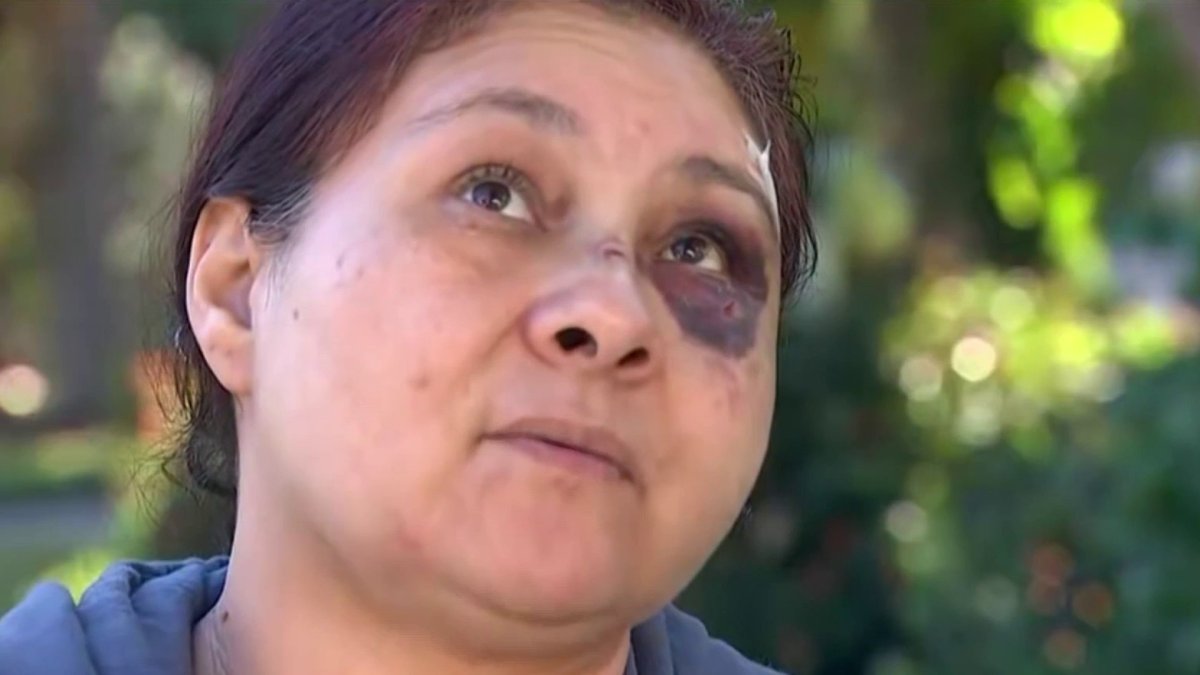Imagine this: you're a mom trying to keep your family safe, but the person who once threatened that safety is now closer than ever. Mother fears as attacker moved—it’s a phrase that sends chills down the spine of any parent. This isn’t just about one family; it’s about the millions of parents worldwide who face similar struggles every day. The emotional weight of living under constant fear can crush even the strongest souls.
When we talk about "mother fears as attacker moved," we’re diving deep into the psychological, emotional, and practical challenges faced by mothers in such situations. It’s not just about the fear itself—it’s about the ripple effect on family dynamics, mental health, and overall well-being. We’ll explore this topic from all angles, offering solutions and resources that can help turn fear into action.
This isn’t just another article; it’s a guide designed to empower mothers everywhere. Whether you’re dealing with a stalker, domestic violence survivor, or simply concerned about your community's safety, this piece will provide valuable insights and actionable steps. Let’s get started.
Read also:Ted Cruzs Coolest Thing Mocked The Inside Scoop On Whats Really Going On
Understanding the Fear: What Does "Mother Fears as Attacker Moved" Truly Mean?
In simple terms, "mother fears as attacker moved" refers to the intense anxiety and fear experienced by mothers when an individual they perceive as a threat relocates closer to them or their families. This could involve ex-partners with violent tendencies, stalkers, or anyone who has previously caused harm. For moms, the stakes couldn’t be higher—protecting their children becomes their top priority.
The fear isn’t irrational; it’s deeply rooted in survival instincts. Studies show that women who have experienced domestic violence often live in constant fear, even after escaping dangerous situations. According to the National Coalition Against Domestic Violence (NCADV), approximately 20 people per minute are physically abused by an intimate partner in the U.S. alone. That’s over 10 million women and men annually.
For mothers, this statistic hits home hard. Knowing that someone who once posed a threat is now closer can trigger a flood of emotions—fear, anger, helplessness, and sometimes even guilt. But what exactly causes these fears to escalate? Let’s break it down:
- Lack of control over the situation
- Fear for children's safety
- Uncertainty about future interactions
- Emotional trauma resurfacing
Why Do Mothers Feel This Way?
Mothers are naturally wired to protect their young. When a perceived threat reappears, it activates primal instincts designed to keep offspring safe. However, modern threats like stalkers or abusive partners add layers of complexity. Unlike predators in the wild, human attackers often operate within societal norms, making them harder to detect and avoid.
Moreover, societal expectations place additional pressure on mothers. They’re expected to be strong, calm, and collected, even when facing extreme stress. This pressure can lead to internalized shame or guilt, further complicating the healing process.
Biography: Real Stories of Mothers Who’ve Faced This Fear
Before we dive deeper into solutions, let’s take a moment to honor the stories of real mothers who’ve faced this nightmare. While their identities may remain anonymous for safety reasons, their courage inspires countless others.
Read also:Ohio State Transfers Bold Weight Loss The Remarkable Journey
| Name | Location | Age | Situation |
|---|---|---|---|
| Sarah J. | New York | 34 | Escaped domestic violence; ex-partner moved to nearby city |
| Emily R. | California | 38 | Stalker relocated after court order expired |
| Jessica L. | Texas | 42 | Abusive partner released from prison; living nearby |
Lessons Learned from Their Experiences
Each of these women faced unique challenges, yet common themes emerged:
- Importance of support networks
- Value of legal protections
- Need for emotional healing
These stories remind us that no mother should face these fears alone. There’s strength in community, advocacy, and self-care.
Legal Protections: Know Your Rights
One of the most powerful tools in combating fear is understanding your legal rights. Restraining orders, protective custody arrangements, and even relocation assistance programs exist to shield mothers and their children from harm. However, many aren’t aware of these resources.
Here’s a quick rundown of key legal options:
- Restraining Orders: Prevents the attacker from coming near you or contacting you.
- Safe Housing Programs: Offers temporary or permanent relocation assistance.
- Victim Advocacy Services: Provides guidance through the legal process.
Remember, ignorance of the law can leave you vulnerable. Educating yourself empowers you to make informed decisions.
Steps to Take Immediately
If you’re currently in a situation where an attacker has moved closer, here’s what you should do:
- Contact local law enforcement immediately.
- Reach out to victim advocacy groups for support.
- Document all interactions with the attacker.
These steps may seem daunting, but they’re crucial in ensuring your safety and that of your loved ones.
Mental Health Matters: Coping with the Emotional Toll
Fear takes a toll on mental health. Anxiety, depression, and PTSD are common among mothers who’ve faced threats. Ignoring these symptoms won’t make them go away—they’ll only grow stronger. Seeking professional help is one of the bravest things you can do.
Therapy, counseling, and support groups offer safe spaces to process emotions and develop coping strategies. Techniques like mindfulness, journaling, and deep-breathing exercises can also provide immediate relief.
Building Resilience Through Self-Care
Self-care isn’t selfish—it’s essential. Here are some simple yet effective ways to nurture your mental well-being:
- Set aside time for activities you enjoy.
- Practice gratitude daily.
- Connect with supportive friends and family.
By prioritizing your mental health, you’re better equipped to handle challenges and protect your family.
Community Support: You’re Not Alone
No one should face fear alone. Building a strong support network is vital in overcoming adversity. Whether it’s friends, family, or local organizations, surrounding yourself with positive influences can make all the difference.
Many communities offer resources specifically for mothers in need. From parenting groups to crisis hotlines, help is available if you know where to look.
How to Find Support in Your Area
Start by reaching out to:
- Local shelters
- Domestic violence hotlines
- Churches or religious organizations
Don’t hesitate to ask for help—you deserve it.
Technology as a Tool: Staying Safe in the Digital Age
In today’s world, technology plays a significant role in both creating and combating fear. GPS tracking apps, smart home devices, and even social media can either enhance or compromise your safety. Knowing how to use tech wisely is key.
Consider implementing these safety measures:
- Install a home security system.
- Use GPS tracking apps to monitor children’s locations.
- Adjust privacy settings on social media accounts.
Technology is a double-edged sword, but with the right knowledge, it can become a powerful ally.
Staying Safe Online
Social media can be a breeding ground for stalkers and abusers. Protect yourself by:
- Limiting personal information shared online.
- Blocking or reporting suspicious accounts.
- Using strong, unique passwords.
Remember, your digital footprint matters—guard it carefully.
Parenting Under Pressure: Tips for Raising Resilient Kids
As a mother, your primary focus is always your children. Teaching them resilience in the face of adversity is one of the greatest gifts you can give. Open communication, consistency, and love form the foundation of strong parent-child relationships.
Here are some tips for raising resilient kids:
- Encourage open dialogue about feelings.
- Model healthy coping mechanisms.
- Provide a stable, loving environment.
By fostering resilience, you’re equipping your children with tools to overcome any challenge life throws their way.
Addressing Children’s Fears
It’s normal for kids to pick up on their parents’ anxiety. Reassuring them without dismissing their concerns is crucial. Validate their feelings while reinforcing safety measures in place.
For example:
“I know you’re scared, honey, but we’ve taken steps to keep us safe. We’ll get through this together.”
Simple statements like these can go a long way in calming young minds.
Conclusion: Turning Fear Into Action
Mother fears as attacker moved doesn’t have to define your life. With the right resources, support, and mindset, you can transform fear into action. Educate yourself, lean on your community, and prioritize your mental health. Most importantly, remember that you’re not alone—millions of mothers worldwide stand with you.
We invite you to share your thoughts in the comments below. Have you faced similar challenges? What strategies worked for you? Together, we can create a safer, more supportive world for mothers everywhere. Don’t forget to bookmark this page and explore other articles on our site for more valuable insights.
Table of Contents
- Understanding the Fear: What Does "Mother Fears as Attacker Moved" Truly Mean?
- Biography: Real Stories of Mothers Who’ve Faced This Fear
- Legal Protections: Know Your Rights
- Mental Health Matters: Coping with the Emotional Toll
- Community Support: You’re Not Alone
- Technology as a Tool: Staying Safe in the Digital Age
- Parenting Under Pressure: Tips for Raising Resilient Kids
- Conclusion: Turning Fear Into Action


